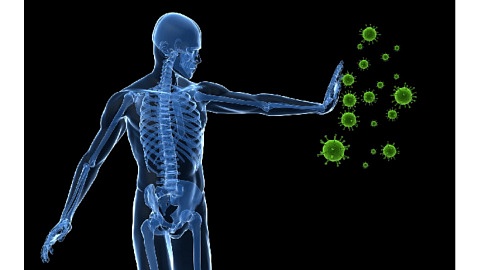A resilient immune system is essential for maintaining good health and preventing many different types of illnesses. The immune system helps protect the human...
Maintaining a healthy immune system – a top priority for our well-being
Spring is just around the corner, but before those flower buds peak through you might still be worried about catching a cold or a viral infection. The start of 2020 brought on multiple respiratory viral infections, including a novel coronavirus throughout North America and internationally. So, it’s not surprising that maintaining a healthy immune system remains a top priority for many of us.
Our immune system is made up of organs, specialized cells, signaling molecules, proteins and communication pathways to help defend against unwanted invaders. The cold seasons bring about viral and bacterial infections which can result in a range of symptoms such as sore throat, cough, fever, sneezing, headache, body aches and congestion. Coronaviruses are a family of viruses that bare a similar appearance to a crown (corona = crown in latin). There are numerous types of viruses within this family and some types cause the common cold. Rhinoviruses (rhino = nose), are another family of viruses and are predominantly the main cause of the common cold. With influenza A, influenza B, coronaviruses and rhinoviruses, there is certainly no shortage of infectious agents that can lead to illness during the winter months. Most people completely recover from uncomplicated infections like the common cold or flu with the help of a well-functioning immune system. However, if the immune system is not functioning optimally, getting sick often or having difficulty recovering may become a common occurrence.
There are a variety of factors that can impact optimal functioning of the immune system, including:
- High stress
- Poor sleep
- Inadequate nutrition
- An underlying health issue, such as heart disease or cancer
All these factors can contribute to poor immune health.
Stress is a normal physiological response that promotes survival and is actually good for us, but only when it’s short-lived. Stress that lingers for weeks, months or years can bog down the immune system, resulting in poor immune activation and a weakened response overall[1]. This is why following a stressful event such as a string of exams or the loss of a loved one, most people fall ill. So, although short-term stress is beneficial to our health, long-term, chronic stress can suppress the immune system.
Sleep also impacts immune health. It’s well known that when you’re sick the body has a strong desire to sleep[2]. Feeling tired, achy and having trouble concentrating are all symptoms to help encourage your body to get more zzz’s. While asleep, the immune system works hard to battle against the unwanted infection. Studies involving sleep-deprived individuals reported altered immune markers, which can potentially increase the susceptibility to respiratory infections[3]. So the next time you feel the beginnings of an infection, getting under the covers for some shut-eye can actually benefit your immune system.
Additionally, a nutrient-rich, varied diet is an important factor in maintaining a healthy immune system. Studies have shown a deficiency in various vitamins or minerals (such as vitamin C and zinc), have been associated with immune system incompetency[4]. Consuming colourful fruits and vegetables, whole grains and proteins contribute to immune cell activation and antibody production. Both these processes help identify and target unwanted invading organisms. Hence, ensuring your diet includes a variety of essential nutrients plays a major role in immune function.
Despite getting a good night’s rest and eating well some individuals may need additional support for optimal immune wellness. There are a number of herbal agents that come to mind to help keep the immune system working effectively.
- Echinacea species are widely used in herbal medicine throughout Europe and North America for upper respiratory infections. Various compounds within the root have shown to reduce the inflammatory immune response in rhinovirus-infected cells[5]. Echinacea is considered a low-risk and effective alternative to the standard symptomatic medicines for common cold treatment[6].
- Elderberries are an edible berry that contain phenolic compounds, which are thought to enhance immune system responses. Elderberry syrup is a traditional remedy for respiratory infections frequently used in Europe. Various compounds in the product have shown to suppress viral replication and stimulate an immune response[7], which helps the body to recover from a respiratory viral infection such as the flu.
- Carrageenan is derived from red algae species and used in the food, cosmetic and pharmaceutical industry. Carrageenans are primarily used as emulsifiers and thickening agents for products like ice cream, toothpaste, non-dairy milk alternatives and gels. However, they also have antiviral properties. Studies have shown carrageenan nasal sprays improved the duration of illness caused by human rhinovirus, human coronavirus and influenza A[8]. It is known that carrageenans block viruses, including influenza A from binding to the surface of cells that line the nasal cavity, creating a physical barrier[9].
- Astragalus is widely used in traditional Chinese Medicine. There are over 100 biologically active compounds in the root that have multiple effects in the body, including targeting inflammation, balancing immune activity, blood-sugar lowering properties and antioxidant effects[10]. Further research and investigation of this herbal agent are on-going. In one study, exposure to Astragalus improved the survival of influenza virus infected cells and improved immune activity against the virus[11]. In Chinese medicine, this well-respected herb is commonly found on the list of herbs to help support the immune system.
Using herbal compounds alongside lifestyle modifications to ensure you are well-rested, eating a variety of healthy foods and managing stress can keep your immune system working hard to protect against common viral agents during the remainder of the cold and flu season.
[1] Dhabhar F.S. (May, 2014). Effects of stress in immune function: The good, the bad and the beautiful. Immunologic Reasearch 58(2-3):193-210.
[2] Imeri L., Opp M.R. (Feb 2009). How (and why) the immune system makes us sleep. Nature Reviews Neuroscience; 10:199-210.
[3] Wilder-Smith A., Mustafa F.B., Earnest A., Gen L., MacAry P.A. (Oct, 2013). Impact of partial sleep deprivation on immune markers. Sleep Medicine; 14(10):1031-1034.
[4] Dhur A., Hercberg P.G. (1990). Relationship between selenium, immunity and resistance against infection. Comparative biochemistry and physiology. C., Comparative pharmacology and toxicology; 96(2):271-280.
[5] Sharma M., Arnason J.T., Burt A., Hudson J.B. (Feb, 2006). Echinacea extracts modulate the pattern of chemokine and cytokine secretion in rhinovirus-infected and uninfected epithelial cells. Phytotherapy research; 20(2):147-152.
[6] Brinkeborn R.M., Shah D.V., Degenring F.H. (Mar, 1999). Echinaforce and other echinacea fresh plant preparations in the treatment of the common cold. A randomized, placebo controlled, double-blind clinical trial. Phytomedicine: international journal of phytotherpay and phytopharmacology; 6(1): 1-6.
[7] Jinoshita E., Hayashi K., Katayama, H., Hayashi T., Obata A. (May, 2014). Anti-influenza virus effects of elderberry juice and its fractions. Bioscience, biotechnology, and biochemistry; 76(9): 1633-1638.
[8] Koenighofer M., Lion T., Bodenteich A., Prieschl-Grassauer E., Grassauer A., Unger H., Mueller C.A., Fazekas T. (Nov, 2014). Carrageenan nasal spray in virus confirmed common cold: individual patient data analysis of two randomized controlled trials. Multidisciplinary Respiratory Medicine; 9:57.
[9] Besednova N., Zaporozhets T., Kuznetsova T., Makarenkova I., Fedyanina L., Kryzhanovsky S., Malyarenko O., Ermakova S. (June, 2019). Metabolites of seaweeds as potential agents for the prevention and therapy of influenza infection. Marine drugs; 17(6):373.
[10] Fu J., Wang Z., Huang L., Zheng S., Wang D., Chen S., Zhang H., Yang S. (Sept, 2014). Review of the botanical characteristics, phytochemistry, and pharmacology of Astragalus membranaceus (Huangqi). Phytotherapy research; 28(9):1275-1283.
[11] Liang Y., Zhang Q., Zhang L., Wang R., Xu X., Hu X. (Dec, 2019). Astragalus membranaceus treatment protects raw264.7 cells from influenza virus by regulating G1 phase and the TLR3-mediatied signaling pathway. Evidence-based complementary and alternative medicine; 2019: 2971604.
Related Posts
Bell Lifestyle Products announced today the
re-release of their popular Liquid Multivitamin.
“As a leader in liquid multivitamins, we
wanted to take the...
Bell Lifestyle Products announced today the release of their
new Immune Support product for the Canadian market. This product joins a
comprehensive family of...
Bell Lifestyle Products announced today the re-release of their popular Liquid Multivitamin. “As a leader in liquid multivitamins, we wanted to take the...
Bell Lifestyle Products announced today the release of their new Immune Support product for the Canadian market. This product joins a comprehensive family of...
Categories
- Allergy Relief
- Bell Lifestyle News
- Brain and Vision Health
- Depression
- Digestive Health
- Eating Healthy
- Energy Boosts
- Fitness
- Foods for Energy
- Heart and Lung Health
- Herbs
- Immune System Support
- Lifestyle
- Men's Health
- Mental
- Motivation
- Natural Remedies
- Nutrition
- Pain Relief
- Physical
- Recipes
- Relationships
- Sexual Health
- Skin and Hair Health
- Sleep Health
- Social
- Stress Relief
- Uncategorised
- Videos
- Weight Management
- Women's Health
- Your Wellness Now
Follow us on Twitter
#90 Bladder One for Women™ is a convenient one-a-day capsule for urinary tract health, featuring herbal extracts in… twitter.com/i/web/status/1…
May 2023Urinary tract infections - UTI: To treat or prevent? That is the question. Find out more about causes and treatme… twitter.com/i/web/status/1…
May 2023"How you feel is very important to how you look. Healthy equals beautiful." - Victoria Principal #womenshealth https://t.co/OPShoEbOXb
May 2023
© Copyright 2024. All rights reserved.





